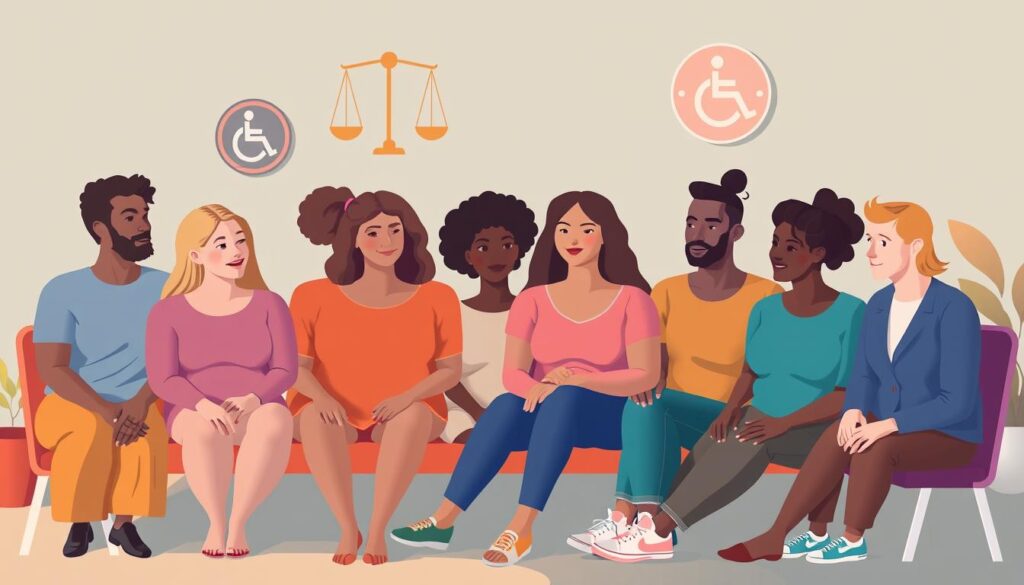The Americans with Disabilities Act (ADA) says a disability is a physical or mental issue that limits big life activities. Obesity being a disability has changed over time. The Equal Employment Opportunity Commission (EEOC) says severe obesity (BMI over 40) can be a disability, even without a medical condition.
Since over 40% of U.S. adults are obese, and many have health issues like heart disease and sleep apnea, knowing obesity’s legal status is key.
Federal courts say severe obesity might be a disability under the ADA if it limits major life activities. This means obese people might get legal protections and work place adjustments. It’s important for obese individuals to know their rights to be treated fairly.
Key Takeaways
- Obesity can be considered a disability under the Americans with Disabilities Act (ADA) if it substantially limits major life activities.
- The Equal Employment Opportunity Commission (EEOC) has recognized that severe obesity (BMI over 40) can be a disability, even without an underlying medical condition.
- Federal courts have ruled that obesity may qualify as a disability, granting legal protections and reasonable accommodations for affected individuals.
- Understanding your rights as an obese individual is crucial to ensuring fair treatment in the workplace and beyond.
- The legal landscape surrounding obesity and disability is constantly evolving, with ongoing debates and court decisions shaping the scope of protections.
Understanding the Legal Definition of Disability Under ADA
The Americans with Disabilities Act (ADA) says disability is a physical or mental issue that limits major life activities. For people with obesity, this could mean not being able to walk, breathe well, or do manual tasks. Severe obesity, with a Body Mass Index (BMI) over 40, is more likely to be seen as a disability. This is especially true if it’s linked to other health problems.
Physical and Mental Impairments
The Equal Employment Opportunity Commission (EEOC) looks at how an employee’s issue, like obesity, affects their job or daily life. Employers need to look at medical proof to see if someone’s weight is protected under the ADA.
Major Life Activities Affected by Obesity
Obesity can make it hard to do things like walk, stand, lift, and do tasks that need physical effort. How much it limits someone can vary, and employers must look at each case carefully.
Substantial Limitations Requirements
To be seen as a disability under the ADA, an issue must really limit someone’s ability to do major life activities. This looks at how bad the condition is, how long it lasts, and how it affects someone’s life. Employers are key in deciding if someone’s obesity counts as a disability.
| Obesity Statistics | Percentage |
|---|---|
| Obesity defined as BMI 30+ | 20% or more above ideal weight |
| Obesity associated with health issues | Gallstones, osteoarthritis, sleep apnea, diabetes, heart disease, etc. |
| ADA definition of disability | Physical/mental impairment substantially limiting major life activities |
| Accommodations for obese employees | Large-rated equipment, job restructuring, flexible schedules |
It’s important for employers and employees to understand the ADA’s rules on obesity as a disability. By understanding physical issues, life activities, and how much they limit someone, companies can follow the law. They can also make sure their workplace supports everyone.
Is Obesity a Disability: Current Legal Perspectives
The laws about obesity and disability in the U.S. are changing. Courts have looked into if obesity is a disability under the Americans with Disabilities Act (ADA). Important decisions help us understand the current views on this topic.
In a key case, a court in Washington state said severe obesity could be a disability under state law. The Seventh Circuit Court of Appeals also said obesity might be an ADA disability. This is if it makes it hard to do big life activities like walking or standing.
These decisions show how important it is to think about obesity in the workplace. The law says obesity is a disability under the ADA only if it’s caused by a health problem. Severe obesity (BMI over 40) is more likely to meet this threshold than general obesity.
“Obesity can make it harder to do things like walking, standing, or breathing.”
Employers need to know about these changes and the risk of obesity-related disability claims. Not making accommodations for employees with obesity can lead to lawsuits. This can also cause big financial losses.
The laws about obesity and disability are getting more complex. As courts make more decisions, everyone needs to stay up to date. Employers and employees must work together to handle obesity-related issues at work.
Evolution of Obesity Rights in the Workplace
The way we see obesity rights at work has changed a lot lately. In 2008, the Americans with Disabilities Act (ADA) got bigger. Now, people can be seen as disabled without proving their condition severely limits them This means many obese workers can now fight against unfair treatment or lack of support at work.
Historical Treatment of Obesity Claims
At first, some courts said extreme obesity could be an ADA issue without needing a medical reason. But, higher courts started siding with employers. They said obesity is only an ADA issue if it comes from a real health problem.
Recent Court Decisions and Precedents
The Washington Supreme Court said obesity is “always” seen as a disability under the Washington Law Against Discrimination (WLAD). This means obese people are likely protected at work. But, some judges thought we should look at each case differently, not just assume obesity is a disability.
EEOC Guidelines and Interpretations
Now, employers must treat obesity the same as other disabilities when deciding who to hire or keep. This shows a move towards fairness for obese workers. Employers should check their job requirements to make sure they’re not unfairly keeping out obese people.
These decisions show how important it is to help workers with weight bias discrimination. They highlight the need for workplaces to be more inclusive. This means making sure everyone can do their job, with or without special help.
Qualifying Conditions for Obesity as a Disability
Obesity is a complex medical condition. It can affect a person’s health and well-being a lot. When we talk about obesity as a disability under the Americans with Disabilities Act (ADA), things get a bit tricky.
Severe obesity, with a Body Mass Index (BMI) of 40 or higher, is more likely to be seen as a disability. But, the legal process looks at many factors.
To see if an employee’s obesity is a disability, HR folks look at medical proof from doctors. The Equal Employment Opportunity Commission (EEOC) checks how the condition affects the job or daily life. Obesity can lead to other health issues like diabetes, some cancers, and high blood pressure. These issues might be disabilities on their own under the ADA.
| Condition | Likelihood of Qualifying as a Disability |
|---|---|
| Severe Obesity (BMI over 40) | More likely to qualify as a disability under the ADA |
| General Obesity (BMI between 30-40) | May not automatically qualify as a disability, but can be considered based on related medical conditions |
Deciding if obesity is a disability under the ADA is done one case at a time. It focuses on the person’s specific challenges and how they affect their life. By understanding this, HR leaders can make sure people with obesity get the help they need. This makes the workplace more welcoming and fair for everyone.

Medical Conditions Associated with Obesity
Obesity can make many health problems worse. It can affect how well you walk, stand, or breathe. This makes it hard to do job tasks, so you might need special help at work.
Physiological Disorders
People who are overweight often have sleep apnea. This is when you stop breathing while you sleep. It makes you very tired and hard to focus during the day.
Related Health Complications
Being overweight also raises the risk of heart disease, high blood pressure, and Type 2 diabetes. These conditions might need special work setups or schedules to help you stay focused and productive.
Impact on Daily Functions
Obesity can also cause musculoskeletal problems like osteoarthritis. This makes it hard to stand, walk, or do other physical tasks. It’s important to have the right help at work to succeed.
| Obesity Category | BMI Range | Health Risks |
|---|---|---|
| Overweight | 25.0-29.9 kg/m² | Increased risk of chronic health conditions |
| Class I Obesity | 30.0-34.9 kg/m² | High blood pressure, heart disease, diabetes |
| Class II Obesity | 35.0-39.9 kg/m² | Severe health risks, reduced life expectancy |
| Class III Obesity | ≥ 40.0 kg/m² | Extremely high risk of serious medical conditions |
It’s key for employers to know how obesity affects health and daily life. This way, they can offer the right obesity-related workplace accommodations. This helps obese people do well at work.
Workplace Protections for Obese Individuals
Employers must make work places better for employees with disabilities, like obesity. This can mean making chairs fit better, making doors wider, or letting people work from home. HR folks need to talk with obese employees to find the best help. Keeping records of these talks helps avoid legal trouble.
Not helping an obese employee can lead to big legal problems. This includes disability discrimination claims and big fines.
The ADA Amendments Act of 2008 says obesity can be a disability if it limits life activities. This makes it easier for obese people to get legal help at work. Employers can’t make rules based on how someone looks, like their height or weight.
Even though weight bias discrimination is still a big issue, some places are trying to help. Michigan is the only state that says it’s okay to not discriminate based on weight. Other places, like Massachusetts and New York, are thinking about it too. Cities like San Francisco and Washington, DC, also say no to weight-based job rules.
| Workplace Protections for Obese Individuals |
|---|
| – Employers must provide reasonable accommodations, such as ergonomic adjustments and flexible schedules |
| – Obesity can be considered a disability under the ADA Amendments Act of 2008 |
| – Employers are prohibited from enforcing discriminatory appearance policies or hiring criteria based on weight |
| – Some states and cities have enacted legislation to prohibit weight-based discrimination |
Employers need to act fast when someone says they’re being harassed, no matter how they look. By knowing their duties and helping, employers can make workplaces better for everyone, especially those with obesity.

Reasonable Accommodations in the Workplace
Employers must help obese employees at work. They can do this by making work easier or changing schedules. This makes work better for everyone, especially those with obesity challenges.
Types of Available Accommodations
There are many ways to help obese employees:
- Ergonomic furniture and equipment, such as oversized chairs, adjustable desks, and mobility aids
- Flexible scheduling to accommodate medical appointments or weight management programs
- Remote work options to minimize physical demands and facilitate attendance
- Designated parking spots or elevator access for improved mobility
- Personal assistants to help with physically demanding tasks
Employer Responsibilities
Employers must work with obese employees to find solutions. They need to understand the employee’s needs and find a good solution. Keeping records is important to follow the law and avoid legal problems.
Employee Rights and Requirements
Obese employees can ask for help at work. They might need to show a doctor’s note to explain their needs. They must also help find a solution that works for everyone.
“Accommodating obese employees is not only the right thing to do, but it can also benefit businesses by reducing healthcare costs and improving productivity.”
Addressing Weight Discrimination and Bias
Weight stigma and discrimination at work hurt employees’ work, mood, and rights. HR folks are key in stopping weight-based discrimination. They make sure everyone feels valued and respected.
To tackle weight bias and discrimination, HR teams should:
- Teach about the Americans with Disabilities Act (ADA) and how to fight weight biases.
- Start wellness programs that don’t judge by weight or size. Focus on health and happiness.
- Keep medical info and weight-related requests private.
- Regularly check in to make sure work places are fair for everyone.
Recent stats show weight discrimination has jumped by 66% in ten years. It’s now as big a problem as racial bias. Yet, many workplaces ignore the issue of obesity stigma. By tackling weight bias discrimination and stigma and prejudice against obesity, HR can make work places better for everyone.
“The stigma of obesity has not been addressed as a legitimate concern by those working to combat obesity.”
Employers must fight weight bias discrimination and stigma and prejudice against obesity. This is both a legal and moral duty. By being proactive, HR can build a workplace that celebrates differences, values everyone’s input, and helps everyone succeed.
Legal Remedies and Protection Measures
If you’re an employee facing obesity-related disabilities, you might get social security benefits. Employers who don’t make reasonable accommodations could see more disability claims. To avoid legal trouble, employers should have clear policies on obesity as a disability.
They should also work on creating a welcoming workplace. This includes teaching about ADA compliance and reducing bias.
Employers can make their workplace better by starting wellness programs. They should keep things private and check on accommodations often. This helps everyone and keeps employers out of legal trouble.
It’s important for employers to talk with employees about disabilities. They need to understand if someone has a disability before making any decisions. By doing this, you can help make a workplace that values everyone and supports their success.


A Life-Changing Experience with This Weight Loss Supplement (Nagano Tonic)
I’ve always struggled with finding a weight loss solution that actually works for me. Like many, I’ve tried numerous diets, exercise routines, and supplements over the years—some worked for a short time, but nothing ever gave me long-term results. That was until I decided to try the weight loss supplement I found : Link to the Supplement.
From the moment I started using it, I noticed a difference. Not only did I feel more energized, but my cravings also became more manageable. The best part? I started seeing results much quicker than I anticipated! Over the course of just a few weeks, I noticed a significant reduction in belly fat and overall weight loss that I hadn’t been able to achieve before.
What makes this supplement stand out from all the others I’ve tried is how it supports me in my daily routine without any jitters or energy crashes. I’m able to stay focused and motivated, which has made it easier to stay on track with my diet and exercise plan.
This product truly exceeded my expectations, and I feel more confident and healthier than ever before. If you’re struggling with your weight loss journey like I was, I highly recommend giving this supplement a try. It’s been a game-changer for me, and I’m sure it can work wonders for you too!
Contant Them on email .. tonicnagano50@gmail.com
I’ve tried so many weight loss products over the years, but nothing worked like this supplement! Since I started using it, I’ve noticed a big difference in my energy levels and appetite control. In just a few weeks, I’ve lost weight and feel so much better. It’s been easy to stick with, and the results speak for themselves. Highly recommend this to anyone looking to make a real change!
wasn’t sure what to expect, but this weight loss supplement has really impressed me! After just a few weeks of use, I’ve already dropped a few pounds and feel more motivated to stay active. It’s helped curb my cravings and boosted my energy throughout the day. I’m excited to keep going and see even better results. Definitely worth trying!
Reach them on tonicnagano50@gmail.com
I was skeptical at first, but this supplement has truly made a difference in my weight loss journey. I’ve lost weight without feeling deprived or sluggish. My cravings are under control, and I feel more confident in my body. It’s easy to incorporate into my daily routine, and the results speak for themselves. I’m so glad I gave it a try!
Thanks David, i do use the link to make my purchase. you can get too here http://surl.li/iasppy
This Nagano Tonic has been amazing! In just a few weeks, I’ve lost weight, feel more energized, and my cravings are under control. Highly recommend it!
Thats the link to purchase http://surl.li/iasppy